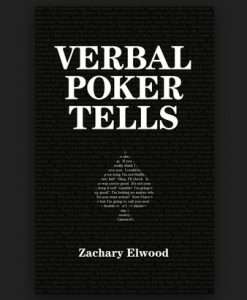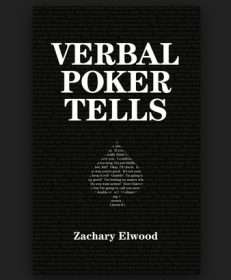The Sunday Review: Verbal Poker Tells, by Zachary Elwood
Zachary Elwood’s latest book, Verbal Poker Tells, continues to solidify the author’s growing recognition as an expert on psychological gamesmanship, focusing on the real meanings behind verbal exchanges at the poker table.
In Verbal Poker Tells, Elwood examines dozens of hands to illustrate the verbal ways in which people often give away their card holdings at the poker tour. The examples, culled from several thousands of live and recorded hands viewed by the author, are presented within a larger framework of examining and explaining players say the things they do at the table.
 Is your opponent’s exchange a bluff or a boast? Is it a level-one misdirection or a level-two stab at reverse psychology? Deciphering the hidden meanings behind various types of exchanges, from casual $1/$2 cash games to huge, televised poker events, is the basis for Elwood’s book. It’s a follow-up of sorts to Elwood’s debut poker strategy book, Reading Poker Tells, which quickly earned its own place on poker’s limited bookshelf of “psychological strategy” offerings.
Is your opponent’s exchange a bluff or a boast? Is it a level-one misdirection or a level-two stab at reverse psychology? Deciphering the hidden meanings behind various types of exchanges, from casual $1/$2 cash games to huge, televised poker events, is the basis for Elwood’s book. It’s a follow-up of sorts to Elwood’s debut poker strategy book, Reading Poker Tells, which quickly earned its own place on poker’s limited bookshelf of “psychological strategy” offerings.
Zach Elwood received high praise for Reading Poker Tells, and his latest effort promises more of the same. Whether this book (or both) will eventually be viewed as a seminal poker strategy book remains to be determined, but — particularly as it relates to casual, recreational play — it’s a big moneymaker for those willing to invest the time and digest the concepts explored within its pages.
As Elwood himself repeatedly states, the book’s knowledge is most effectively employed against lesser poker players. The better the player, the less likely they are to give away tons of information about their hands, but even famous, rich players often employ verbal gambits that often provide as much insight into their own hands, even as they’re trying to steer their opponents toward certain responses. This complex give-and-take speaks to poker’s own inner game, a subject that few poker strategy books attempt to tackle.
Verbal Poker Tells, which checks in at a hefty 438 pages, breaks down its content into several major, often overlapping sections. The primary sections include an overview on deception and truth talking (with examples), misdirections and related ploys, defensive statements, “significant bet” verbal patterns (an examination of how verbal exchanges and meanings can change when the pot is large), general verbal patterns, and information-gathering and manipulative ploys.
Interspersed throughout these and other sections are the hand examples themselves, which help link the specific tactic to the concept.
To be fair, Verbal Poker Tells is far from an easy read, and its emphasis will likely shoot far beyond the interests of beginners and casual players. (It’s not the champion of tough-to-read poker books, however; Bill Chen’s and Jarrod Ankenman’s The Mathematics of Poker still holds that honor.) However, for players who have a serious interest in improving their live games, Elwood’s latest may well be looked upon as a must-read, weighty though it is. As with Reading Poker Tells, the insights presented are well worth the time and effort invested.
It’s also refreshing to read a book whose author admits he’s still growing and learning with the game, and that poker’s complexities mean that being an “expert” still doesn’t mean one has all the answers. One of the strengths of this book is that Elwood has sought out and included input from a number of prominent players who were impressed enough by Elwood’s first book to join in this second, even more detailed effort.
Is it a perfect book? Of course not. Despite its multiple sections and decent focus, the book still suffers from organizational difficulties (particularly in its first third). Elwood’s writing also tends toward wordiness and redundancy. As with Reading Poker Tells, it’s the type of small-publisher effort that could have been improved even more by major-house editing. That’s true even if it is smoother in the reading than, for example, the typical TwoPlusTwo hackjob; few poker strategy books escape being clunky in spots, and this is no exception.
Elwood himself even recommends that the book be sampled in small doses, and much of the real meat of the book is in its latter half. This reviewer concurs, noting that you won’t get through this book and understand its insights in a single sitting.
All told, though, Verbal Poker Tells is a solid second effort. Given how narrow the “tells” niche is, however, one wonders if there’s room for a third.
Verbal Poker Tells, by Zachary Elwood
Via Regia LLC
www.readingpokertells.com
438 pages ($31.95, softcover)
(Editor’s note: ‘The Sunday Review’ is an occasional, recurring feature wherein FlushDraw’s contributing editor, Haley Hintze, offers a detailed look inside various forms of poker-related media, including books, movies, television, even online content. FlushDraw accepts books for review but does not guarantee publication of a review and does not specifically promote any material thus reviewed. For more information on submitting items for possible review, contact the editor at hlhintze@gmail.com.)




















COMMENTS